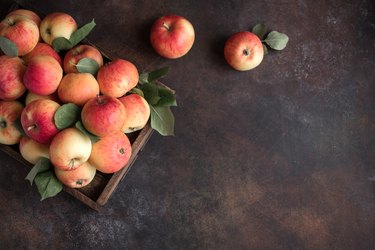
Your body needs a certain amount of cholesterol to build its cells — but having too much cholesterol in your system can elevate your risk of serious health problems. The best fruits and veggies that lower cholesterol tend to be those rich in fiber and a few select vitamins.
First, About Cholesterol
Video of the Day
As the American Heart Association (AHA) notes, cholesterol isn't inherently bad. In fact, your body needs a certain amount of this waxy substance to build cells. Your liver makes all the cholesterol you need, but you also get dietary cholesterol from eating animal foods.
Video of the Day
Those animal-sourced foods also tend to be high in saturated fat, which causes your liver to make more cholesterol. Some tropical oils, including palm oil, palm kernel oil and coconut oil, can have a similar effect.
As the AHA goes on to explain, there are two types of cholesterol: LDL or low-density lipoprotein, which can be generalized as "bad" cholesterol, and HDL or high-density lipoprotein, which is generally classified as "good" cholesterol.
High levels of LDL cholesterol can increase your risk of cholesterol building up along the inner walls of your arteries over time, while high levels of HDL cholesterol can help keep this from happening. So ideally, you want a ratio of high levels of HDL to low levels of LDL.
One thing the AHA doesn't do is quantify specific cholesterol levels as "good" or "bad." It does recommend that all adults age 20 or older have their cholesterol tested every four to six years. But it also emphasizes the importance of evaluating your cardiovascular risk factors as a comprehensive whole, with your doctor's help — because cholesterol is only one part of the puzzle.
Read more: The 9 Best Cholesterol-Lowering Foods
Vegetables and Fruits for Cholesterol
With that said, if you know that you need to work on lowering your cholesterol levels, what kind of fruits and vegetables will help?
Rich in soluble fiber. The U.S. National Library of Medicine notes that eating foods high in soluble fiber helps keep your digestive tract from absorbing cholesterol. It recommends apples, bananas, oranges, pears and prunes as fruits high in soluble fiber. According to the National Institutes of Health News in Health, beans and peas are some of the best veggie sources of soluble fiber.
Certain vitamins have also been shown to reduce cholesterol levels, although the benefits are often associated with high doses, and sometimes in association with prescription medications. Talk to your doctor before taking supplements or making drastic changes to your diet.
Niacin. As the U.S. National Library of Medicine explains, prescription-level doses of niacin (also known as vitamin B3) helps block how your liver makes cholesterol. The National Institutes of Health suggests potatoes, bananas, edamame, raisins, tomatoes, broccoli, apples, spinach and onions as noteworthy sources of niacin. Whole grains tend to have even more niacin.
Vitamin C. As noted in a meta-analysis published in the June 2016 issue of Clinical Nutrition, vitamin C doesn't always have significant effects on lipid profiles. But it has shown significant reductions in blood lipids for certain subpopulations. The U.S. National Library of Medicine names citrus fruits (including oranges, lemons and grapefruit), red and green peppers, tomatoes, broccoli and greens as good sources of vitamin C.
Vitamin E. The National Institutes of Health explain that vitamin E inhibits oxidation of LDL cholesterol. This is believed to help prevent atherosclerosis, or the buildup of fatty plaques and cholesterol inside your arteries. They note that significant amounts of vitamin E can be had from leafy green vegetables, also naming broccoli, kiwi, mango and tomatoes as noteworthy sources.
Read more: 5 Common Foods That Clog Arteries
Tip
Eating fruits and veggies that lower cholesterol may mean a sudden uptick in dietary fiber intake, which in turn can cause intestinal distress. Increasing your fiber intake slowly can help reduce any intestinal upset.
- American Heart Association: "Cholesterol 101: An Introduction"
- American Heart Association: "What Your Cholesterol Levels Mean"
- U.S. National Library of Medicine: "Niacin for Cholesterol"
- U.S. National Library of Medicine: "How to Lower Cholesterol With Diet"
- Clinical Nutrition: "Systematic Review and Meta-Analysis of Randomised Controlled Trials Testing the Effects of Vitamin C Supplementation on Blood Lipids"
- National Institutes of Health: "Niacin"
- U.S. National Library of Medicine: "Vitamin C"
- News in Health: "Rough Up Your Diet"
- National Institutes of Health: "Vitamin E"
Is this an emergency? If you are experiencing serious medical symptoms, please see the National Library of Medicine’s list of signs you need emergency medical attention or call 911.